All Monitoring
and
evaluation Water
and
sanitation
Environment Social and economic
development Disaster preparedness
and
prevention
 |
 Consultancy Services for Comrat Sanitation Project, Feasibility Study and ESIA
World Bank (IDA)
24 June 2024
The project is a sub-component of the Water Security and Sanitation Project (MWSSP) implemented by the Government of Moldova with the support of the World Bank (IDA) financing. The Feasibility study provided a review of the existing sanitation situation at Comrat and its background conditions, defined the necessary measure to improve those services, ensuring cost-effectiveness and sustainability of proposed solutions. The Environmental and Social Impact Assessment (ESIA) examined the environmental and social risks, impacts, and issues associated with the measures suggested under the Feasibility Study.
more
The assignment comprised the social aspects of the ESIA including socio-economic baseline, institutional, legal and regulatory framework, assessments of impacts, potential risks and their mitigation, Environmental and Social Management Plan (ESMP), management, and monitoring measures, information and disclosure, using the World Bank Environmental and Social Standards as a guideline. |
 |
 Evaluation of the Comprehensive Project Sustainable Development of Beekeeping in Georgia
Ministry of Foreign Affairs of the Czech Republic
May – December 2024
The Project aimed to help increase the production of quality honey and encourage the introduction of efficient and environmentally friendly procedures and practices by addressing the identified impediments to further development of beekeeping in Georgia: Shortage of trained beekeepers who could pass on their experience to others, inadequate conditions for small-scale honey producers and insufficient capacity in laboratories to control honey and bee products for the exports to the EU.
more
The theory – based evaluation assessed the relevance, partnership, and sustainability of project interventions with focus on their coherence and the potential for commercial continuity in the beekeeping value chain, using OECD-DAC evaluation criteria, emphasizing sustainability and identifying best practices to enhance cooperation between the Czech Republic and Georgia. It also evaluated the visibility of the Project and the application of crosscutting themes defined in the Development Cooperation Strategy of the Czech Republic 2018 – 2030. |
 |
 Strengthening of self-dependence of Ukrainian refugees in the Czech Republic
Diaconia ECCB, Centre of Relief and Development, funded by Diakonie Katastrophenhilfe (DKH)
February -August 2024
The project aimed to strengthen the self-reliance of Ukrainian refugees in the Czech Republic by providing comprehensive and professionalized services to improve their integration into local communities and to support their ability to cope with everyday life situations. The project was coordinated by DECCB-CRD, services were provided by its partners in five local Diaconal Centers, Diaconia Centre of Nationwide Programmes and Services Prague, and organization Romodrom.
more
The evaluation analyzed and assessed the project approaches, implementation and activities, considering the specific social and institutional context of the Czech Republic. The principal purpose of the evaluation was to obtain information about strengths and weaknesses of the project itself and provide specific, actionable recommendations and best practice models which could be replicable in the future. |
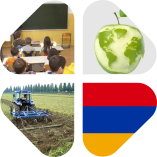 |
 Decentralized Evaluation Services of School Feeding Modalities Applied in Armenia from 2018 – 2023
World Food Programme (WFP), Country Office Armenia, Yerevan Implemented in association with ICON-INSTITUTE GmbH & Co. KG Consulting Gruppe (lead company)
January – November 2024
School Feeding Program (SFP) has been WFP’s flagship activity in Armenia since 2010. The SFP supported 474 schools with the highest number of schoolchildren in 10 provinces of Armenia. In 2019, new transformative school agriculture component and food value chain pilot projects have been added, complementing the feeding Program and green energy solutions. As of July 2023, the SFP has been fully handed over to the Government.
more
The evaluation undertakes a comprehensive review of the School Feeding Modalities Applied in Armenia to understand the main results of the Program so far and to examine the level and strength (sustainability) of the programme nationalization. This includes determining the reasons why certain results occurred or did not occur to draw lessons, derive good practices and provide pointers for learning as well as provide evidence-based findings to inform operational and strategic decision-making. |
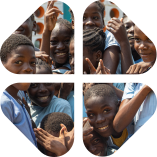 |
 Evaluation of capacity strengthening activities to government and local communities in Sao Tome and Principe, July 2019 - December 2022
World Food Programme (WFP), Sao Tome and Principe Country Office Implemented in association with ICON-INSTITUTE GmbH & Co. KG Consulting Gruppe (lead company)
July 2023 – January 2024
The evaluation focused on activities implemented by WFP and its partners in the six districts of Sao Tome in support of capacity-strengthening activities to government and local communities to provide home-grown school feeding, sustainable and equitable local food value chains, stimulate local agricultural markets and provide emergency response feeding to children affected by the COVID-19 pandemic. Also assessed were gender equality and women empowerment, including human rights approaches, accessibility to income generating opportunities for women, and environmental sustainability of smallholder farming activities. Also assessed were gender equality and women empowerment, human rights approaches, accessibility to income generating opportunities for women, and environmental sustainability of smallholder farming activities.
more
The main purpose of the evaluation was to support the planning of the second-generation Country Strategic Plan, to assess WFP capacity strengthening activities, generate useful evidence on key achievements and lessons learned from current Programmes, further informing the new Country Strategic Plan. |
 |
 Dialogue for a global society
Caritas Czech Republic, funded under the EU OP Prague - Growth Pole of the Czech Republic
January - December 2023
The evaluation covered the implementation period January 2023 - December 2023. The project aimed to create better conditions for the involvement of young people in civil society at the local to ensure that the participating municipalities and entities are able to motivate and to subsequently involve young people in addressing local and global challenges and thus exploit their full potential. The broader intention of the project was to contribute to a positive change in the perception of global issues and the interconnectedness of the world in Czech society.
more
The assignment included interim and final evaluations to allow for possible adjustments in planning and implementation, to assess likely impacts and to create an example of good practice transferable to the field of global development education and awareness. |
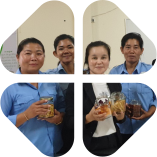 |
 Priority Sector Evaluation: Inclusive Social Development / Education (Cambodia)
Ministry of Foreign Affairs of the Czech Republic
June – December 2023
The evaluation covered six projects in the priority sector of the Czech Development Cooperation – Inclusive social development/education (SDGs 4, 5 and 8.5) which is also the priority sector of the Bilateral Development Cooperation in Cambodia, reflecting the need to tackle poverty and social inequalities and to promote social stability.
more
The main purpose of the evaluation was to provide specific and feasible recommendations based on consistent findings and conclusions to be used for decisions by the Ministry of Foreign Affairs of the Czech Republic in cooperation with the Czech Development Agency for decisions on the future focus and method of implementation of development projects in the sector Inclusive Social Development in Cambodia. Main focus of the evaluation was on assessment of the extent to which the educational program ensured equal access of Cambodian men and women to affordable, quality, and inclusive vocational and higher education, including university education and to which the acquired skills match the requirements of the labor market. Also assessed was the scope for involving Czech public institutions and the possibility replication. The evaluation used the OECD-DAC evaluation criteria with the emphasis on impact, sustainability and replicability potential, and assessed visibility and application of cross-cutting themes of the Czech Development Cooperation. |
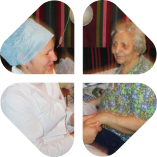 |
 Evaluation of two projects in the priority sector of inclusive social development in Moldova
Ministry of Foreign Affairs of the Czech Republic
July 2022 – December 2022
The evaluation focused on two projects implemented by Caritas Czech Republic in Moldova and Asociația Obștească Pro-Development in the sector of medical and social homecare services: Support and Assistance to the Social Sector in Moldova implemented in 2017-2020 and Ensuring the quality and accessibility of medical-social homecare services in the Republic of Moldova implemented in 2019-2022. The projects built on the support provided to the integrated medical and social homecare services by Caritas Czech Republic since 2007. The evaluation also considered work carried out in the previous projects in the sector as sustainability was a key learning focus of the assignment.
more
The main purpose of this evaluation was to obtain independent, objective and consistent findings, conclusions and recommendations that can be utilized in the decision making by MFA, in cooperation with CzDA and with other participants, about the future focus and implementation of development projects in the evaluated sector, considering the 2030 Agenda for Sustainable Development and the Bilateral Development Cooperation Programme between the Czech Republic and Moldova 2018-2023. The evaluation focused on the assessment of effectiveness and impacts as well as on the verification of sustainability and identification of lessons learned from the completed project including relevance of the approach to increasing access to affordable, quality social and medical homecare services for the elderly and persons with disabilities. |
 |
 Final Programme Evaluation Al Fakhoora Scholarship and Empowerment Programme
Joint venture with Engineering and Management Consulting Center, Palestine, funded by the UNDP/PAPP
June 2022 – March 2023
The Education Above All (EAA) foundation launched the Al Fakhoora Scholarship and Empowerment Programme in 2009 to promote the right to education in conflict and post-conflict regions. Phase I of the programme was implemented from 2009 to 2018 with co-funding from the Islamic Development Bank. Upon successful completion of the first phase and the positive impact seen on the students and their families, Phase II of the programme was launched in 2014 supporting 630 post-secondary students from underserved backgrounds in Gaza to optimize their potential to excel in their academic and professional life. The programme was implemented by UNDP in collaboration with local civil society organizations.
more
The main objective of this evaluation was to assess the performance of the programme and the extent to which the expected results have been achieved. The evaluation identified best practices and lessons learned and provide practical recommendations for EAA, UNDP and relevant stakeholders’ future interventions. The evaluation objectives have been operationalized and guided through a series of evaluation questions and sub-questions, combining qualitative and quantitative methods to facilitate triangulation and the robustness of the evaluation findings. |
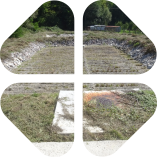 |
 Evaluation of three projects in the Priority Sector of Management of Natural Resources- Water and Sanitation, Bosnia and Hercegovina
Ministry of Foreign Affairs of the Czech Republic
June 2022 – November 2022
The evaluation covered three projects in the priority sector of the Czech Development Cooperation – Sustainable Management of Natural Resources, clean water and sanitation (SDG 6), which is also the priority sector of the Bilateral Development Cooperation in Bosnia and Herzegovina (BiH), reflecting the country’s significant need to develop sustainable sewage disposal and sludge treatment in accordance with the principles of environmentally responsible use of natural resources. Compliance with EU standards in this area is necessary for progress towards EU membership.
more
The main purpose of the evaluation was to provide specific and feasible recommendations based on consistent findings and conclusions to be used for decisions by the Ministry of Foreign Affairs of the Czech Republic in cooperation with the Czech Development Agency on further cooperation in the Natural Resources Management - Water and Sanitation sector in Bosnia and Herzegovina, and possible replication of proven technologies and procedures in other priority countries of the Czech development cooperation. The evaluation covered project and systemic aspects, mapped the synergy of different support instruments and verified the sustainability, potential and relevance of the constructed wetlands intervention. The evaluation also assessed the business partnerships in BiH and business opportunities resulting from the three projects. |
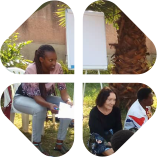 |
 KISUP- Kigali Informal Settlement Upgrading Project: Complementary Study to Prepare AFD’s Unplanned Settlement Upgrading Project of Kagugu and Rwezamenyo in Kigali
Agence Française de Développement / European Union / SECO - CICLIA Cities and Climate in Sub-Saharan Africa Initiative. Consultant to Groupe Huit (Client) executing the Head Contract
April 2022 – March 2023
The objective of this complementary studies was to prepare the conditions for the granting of an AFD loan to the State of Rwanda, City of Kigali, to finance the upgrading of two informal settlements: Kagugu and Rwezamenyo including Nyakabanda extension. The project area hosts almost 40,000 inhabitants, covering a total area of about 240 ha. The studies included: Identification of investments. Identification of support and capacity building needs. Social and environmental safeguard documents. Institutional set-up and implementation modalities.
more
Consultancy included support in the preparation of social safeguards documents with focus on the Gender Action Plan (GAP) and associated studies to serves as a tool for mainstreaming gender and vulnerable groups in the project’s components. This included: Reviews of relevant legal and administrative framework, policies and plans. Analysis of gaps and issues. Formulating the GAP budget, sources of funding, implementation responsibilities, coherence with SEP as well as with other safeguard documents and studies. The GAP is a living document that will evolve as the project progresses. |
 |
 External Evaluation of the Project Academia Young Caritas
Caritas Czech Republic, funded under the EU OP Prague - Growth Pole of the Czech Republic
December 2021 – November 2023
The project works with teachers and other education professionals in participating schools to systematically deepen their knowledge and skills in the social pillar of sustainable development, with the aim to fosters an environment that motivates students towards social cohesion, encourages them to respect socio-cultural diversity, develops their relationship with their social environment and deepens pro-inclusiveness. This education is gradually integrated into the teaching/refresher of various subjects.
more
The evaluation has been implemented in collaboration with the lead analyst for validation of the educational programme and in coordination with the programme methodologists to verify the relevance of the concept and the educational programme in pedagogical practice (formative evaluation) and to assess its effectiveness and impact on the teachers and students summative-outcome evaluation. |
 |
 Water Supply and Sanitation in Moldova Center, Accompanying Measures Component
Sub-consultant to Sachsen Wasser GmbH
June 2021 – December 2024
The project aims at the provision of an environmentally sound and hygienically safe water supply at cost covering and socially acceptable tariffs in parts of the districts of Straseni and Calarasi. The main infrastructure consists of a transmission main pipeline from the capital Chisinau to these two districts and improvements of the water supply networks in respective towns and villages. The accompanying measures component (AMC) includes the institutional strengthening of the Project Executing Agency (PEA, ADR Centru) and the transformation of the local operators into regional operators of their respective districts.
more
Main task is providing consulting, advisory and implementation support and training services to the operators (Apa Canal Straseni and Apacanal Calarasi) with respect to public relations, customer communication and stakeholder engagement. This includes: Assessment of Status Quo at Apa Canals and PEA during the inception phase. Elaborating the public relations, stakeholder participation and customer service concept. Providing awareness and public information training to Apa Canals’ staff and initiating information and awareness raising campaigns (addressing tariff increase, water savings and other relevant topics). Support to planning and implementation of workshops and seminars, horizontal learning. Contribution to the Communication and visibility plan. Support and assistance to the he AMC Team Leader and other experts, with the realization of their tasks as required. |
 |
 Evaluation of the project - Using biomass for development of rural areas in Bosnia and Herzegovina 2016-2021
Ministry of Foreign Affairs of the Czech Republic
June – November 2021
The project funded under the Foreign Development Cooperation (FDC) of the Czech Republic aimed at improving of the living standard of local population by long-term reduction of the CO2 emissions through increasing the share of renewable energy in the country’s energy mix, contributing to SDG 7.2. The “soft” components including legislative anchoring and practical implementation of development policy for sustainable biomass utilization, increasing the quality and availability of wood biomass and development of business models and financial schemes for investments in biomass were implemented by the UNDP Bosnia and Herzegovina. The modernization of heating systems in four model public buildings was implemented by Czech and local companies under the administration of the Czech Development Agency.
more
The main purpose of the evaluation was to verify sustainability, to provide information on efficiency of spent funds, relevance of the implementing procedure and of the thematic focus (renewable energy sources) of the Czech Development Cooperation in Bosnia and Herzegovina. The evaluation examined to what extend this project contributed to increasing energy production from renewable natural sources and to building related infrastructure to make this energy publicly available and what is the potential of use of biomass in Bosnia and Herzegovina. Methods used for data collection: Qualitative (interviews with key partners, group discussions, meetings with key stakeholders, observation, transect walk, case study) and quantitative, based on secondary data (reduction of emissions, changes in the cost of heating, trends in prices of wood biomass). |
 |
 Evaluation of the project - Partnership through Dialog for Sustainable Development
Caritas Czech Republic, 90% co-funded by the Czech Development Agency
May – December 2021
The project implemented between February – December 2021 aimed to actively involve at least 10 partners - representatives of the civil, public and private sectors in the Young Caritas platform and, in cooperation with these partners actively contribute to raising awareness of selected sustainable development goals, to increasing impact of non-formal education under the Young Caritas platform, and to developing active citizenship of young people. Particular focus was on the SDGs Good health and well-being (SDG 3), Reduced inequalities (SDG 10) and Climate action (SDG 13) – reflecting the long-term strategy of Caritas Czech Republic. The ultimate outcome of the project will be a stable network of partners with whom Caritas will cooperate on a long-term basis in raising awareness about Czech Development Cooperation and implementing Agenda 2030.
more
The assignment included formative and summative evaluations. The formative evaluation informed on the functionality of the approach and the need for possible adjustments, creating an example of good practice in interconnection and cooperation across selected sectors – SDGs, transferable in global development education and awareness raising as well as in other contexts of Caritas’ activities. The summative evaluation focused on the assessment of the outcomes before the end of the project. Focus of recommendations was on effectiveness of processes and sustainability of the Young Caritas platform. |
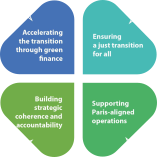 |
 Social Due Diligence & Monitoring in EIB’s ETD Sectors: Provision of the Asia and Eastern Neighborhood Region Expert
GEOtest, a.s./European Investment Bank (EIB)
March 2021 – July 2022
The objective of the assignment was to provide support to PJ/ETD (Environmental and Sustainable Territorial Development Department) on fulfilment of EIB’s Social Standards in EIB financed projects during all phases of the project cycle (preparation or pre-appraisal, appraisal, contracting and implementation, including monitoring) in projects in the Asia and Eastern Neighborhood Region.
more
Saidabad Raw water Conveyor: Updating ESIA - Resettlement: Gap analysis between EIB standards and Bangladesh legislation: Conducting a desk review of Bangladesh expropriation law/s and other laws, regulations and practices applicable to involuntary resettlement (water sector). Gap analysis with EIB standard 6, using as reference other IFIs RAPs, RPFs and other similar work. Identifying the main stakeholders in the delivery of entitlements and compensation. Drafting a report including: i) Summary of expropriation laws and procedures. ii) Mapping of main actors including actors in the delivery of compensation and entitlements. ii) Gap analysis with EIB standard 6 (2022 version). (iii) Issues with the land acquisition and compensation payment process. |
 |
 Evaluation of the pilot project - Increasing Access to and Creating Health Care Options for the Homeless
Ministry of Health of the Czech Republic, funded by the European Union, ESF OPZ
November 2020 – October 2022
The project supported four pilot doctor’s offices in Olomouc, Ostrava, Pardubice and Prague with the aims to increase the availability of and access to health care for homeless people and to examine the effectiveness of linking social and health services for this target group. Support covered: Provision of health care and social outpatient and field services. Educational and awareness raising on infectious and non-infectious diseases. Payment for education related to care of homeless people to healthcare professionals and non-healthcare workers. Other project activities included informing the target group on care options and a conference.
more
The evaluation covered the project implementation process and an assessment of changes in the availability of health care for homeless people in the four pilot doctor’s offices. The process evaluation focused on the method of project implementation, strengths and weaknesses and proposed recommendations for the final phase of project implementation and follow-up. Findings and conclusions from the summative evaluation provided basis for recommendations on the possible institutionalization of the piloted approach. Design of the summative evaluation were quasi-experimental, using pre-and post- non-equivalent comparison design. Counterfactual approach by comparing intervention and comparison groups by propensity score matching has been used to estimate causal effects. |
 |
 Evaluation of the project “Introduction of Quality Standards for Volunteer Work in Social Services”
Slunecnice, z.s., funded by the European Union from the European Social Fund (ESF)
October 2020 – May 2022
The project supported six social service providers – project partners - with setting up a unified system for the recruitment and management of volunteers that is compliant with standards and legal requirements of the relevant Czech legislation and the EU General Data Protection Regulation (GDPR).
more
The process evaluation encompassed: Initial assessment of personnel capacities, review of partners’ methodologies on their compliance with requirements of relevant Czech legislation and the EU GDPR, recommendations for follow up. Capacity building workshop addressing specific weak-links identified during the initial assessment. Mid-term review to assess the progress on capacity building and compliance. Capacity building workshop addressing specific weak-links identified during the mid-term review. Final assessment of compliance and capacities including learning workshop. The evaluation used mixed methods. |
 |
 Evaluation of the project - SDGs and Migration – Multipliers and Journalists Addressing Decision Makers and Citizen's in the EU
Diaconia ECCB Centre of Relief and Development, funded by the European Union
August 2020 – April 2022
The project SDGs and Migration – Multipliers and Journalists Addressing Decision Makers and Citizens in the EU was funded by the European Union under the Raising public awareness of development issues and promoting development education in the European Union (DEAR) program. It aimed to raise public awareness on the sustainable development goals, migration and the relationship between them. The project is implemented in Belgium, Bulgaria, Czech Republic, Greece, Italy, Slovakia and Slovenia.
more
The theory-based evaluation covered assessment of relevance, efficiency and impact of the project, formulation of recommendations to inform future planning and guidance on future modalities of existing partnership between Diaconia ECCB as the Coordinator and partner NGOs. |
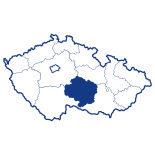 |
 Professional guarantor of the evaluation of the pilot project - Creating a System of Social and Health Care Interface in the Vysocina Region
Vysocina Region, Czech Republic, funded by the European Union from the Operational Programme Employment
June 2020 – March 2023
The project piloted a new systematic approach to improving the coordination and effectiveness of health and social services for Long-term care clients. The aim was to provide inclusive, affordable and equal access to optimized and integrated services by encompassing social and health care under one coordinated system. The main innovation is a Portal of social and healthcare interface and the application of an LTC care model.
more
The Professional Guarantor cooperated closely with the Vysocina Region, the Evaluator and the supplier of quantitative and qualitative research and was responsible for quality assurance of all evaluation outputs including the Evaluation Plan, Intermittent and Final Evaluation Reports, of the collection and analysis of qualitative and quantitative data, and of analysis of data from the Social- and Healthcare interface Portal. Provided recommendations to the Vysocina Region on how the system works and where it needs improvement. |
 |
 Evaluation of the program - FRAME, VOICE, REPORT!
CISU – Civil Society in Development, funded by the European Union
May – November 2020
FRAME, VOICE, REPORT! (FVR) is a fund for civil society organizations with the objective of strengthening awareness and engagement among EU citizens in relation to the Global Goals. FVR has financed DEAR actions (Development Education and Awareness Raising) of European civil society organizations in order to raise awareness and increase engagement of EU citizens in the efforts towards realizing the SDGs with a special focus on gender, migration and climate change. The program is implemented in Belgium, Spain, Denmark, Finland, France, Italy and the Netherlands.
more
The evaluation was conducted for both accountability and learning purposes. Scope covered assessment against the OECD/DAC criteria, assessment of relevance of the action to the DEAR programme and specifically of sub-granting as a specific Lot in relation to the overall DEAR programme and objectives. Recommendations serve as guidance for possible future joint sub-granting programmes in the partnership as well as for partners’ other ways of sub-granting DEAR activities. Primary users are Frame, Voice, Report (FVC) partners, the EC and the DEAR support team. Secondary users include beneficiaries, like-minded organizations, CSO networks and relevant authorities. The evaluation covered the implementation period from the start of the program in 2018 and all 7 implementation countries / regions. Data collection methods included desk study, key informant interviews, National Learning Events with grantees, case studies, key stakeholder meetings, observations. |
 |
 Slovakia Business for Development Cooperation / Rozvojmajstri: Project Review
UNDP, Regional Bureau for Europe and the CIS, Istanbul Regional Hub
February – March 2020
The project aimed to increase the involvement of Slovak private sector in international financial institutions (IFIs) and intergovernmental organizations (IGOs) projects/tenders and increase their capacity for active engagement in development cooperation.
more
Consultancy services encompass: Taking stock of lessons learnt and experiences so far; analyzing Rozvojmajstri performance; assessing the achieved results, their impact and sustainability for Slovak businesses; assessing to what extent the project succeeded in reaching out to Slovak companies (particularly SMEs) and in offering services which are relevant for the Slovak companies; identifying areas for improvement as well as those that can be reinforced to amplify their success; reflecting on the projects' relevance and future opportunities as a leading inclusive business platform, taking in to account the size and the structure of the market. Findings and recommendations of the review will inform the Project Board, the UNDP project team, interested private sector actors and the international development community about the project´s achievements, help to assess the appropriateness of the selected approach, validate Rozvojmajstri key assets and point out lacunae of missed opportunities for future planning and implementation. |
 |
 Improving Quality of Life of the People of Sidama by Ensuring the Availability and Sustainable Management of Water Resources: Introduction of Sustainable Drinking Water Supply Systems in Bura, Dale and Bona Woredas
Czech Development Agency
February – May 2020
Support with sustainable management of natural resources is one of the objectives of the Czech Development cooperation in Ethiopia. This includes planning the capacity of new water sources to meet the demands of the growing population, as well as building the capacities of local water management authorities. The project supports sustainable access to drinking water in three Woredas in Sidama: Bura, Bona and Dale.
more
The purpose of this assignment was to assess existing capacities for sustainable management, operation and maintenance of the newly created or rehabilitated water supply schemes and formulate detailed recommendations for capacity building and training. Recommendations included: Theoretical, on-the job and peer to peer training for operators, managers, technical staff, schools and health institutions, supporting institutions at the woreda and regional levels and the private sector. Procurement of equipment, tools and materials. Building of local capacities for implementation of ability and willingness to pay surveys. Recommendations for rehabilitating and upgrading existing sources of underground water in the project areas. This involved preparing detailed budgets and formulating outputs and activities for each of the schemes. Debriefing the Sidama and Regional authorities and the Embassy of the Czech Republic in Addis Ababa. Feedback from debriefings has been reflected in the mission report. |
 |
 Monitoring and Evaluation of the FIT FOR LIFE II Project
Dobrovolnické centrum, z. s., funded by the EU OPE
August 2019 – July 2021
The project aimed to improve employability of youth in the age group 15 - 30 years with low education by improving their qualification and motivation. It was implemented in Ústí nad Labem by Dobrovolnické centrum, z. s. and funded from EU OPE. Key activities included assessment of individual needs, individually tailored professional support and internship in Germany.
more
4G eval supported the setting up and implementing of the monitoring and evaluation system. This included the preparation of a monitoring and evaluation plan with tools for data gathering and evaluation matrix, implementation support with baseline, mid-term and final evaluations as well as with the use of the monitoring system and preparing illustrative case studies. Information from evaluations and monitoring informs the management and planning of project activities and will be considered by the formulation of future similar interventions. |
 |
 Monitoring and Evaluation of the - Prevention Program FIT FOR LIFE in Usti nad Labem for endangered young people 15+
Dobrovolnické centrum, z. s.
June 2019 – December 2020
The Prevention Program “Fit for Life” aimed to decrease criminogenic behavior of youth in the age group 15 – 26 years by increasing their resistance to socio-pathological behavior and increasing their social integration. The project was implemented by an NGO Dobrovolnické centrum, z. s. supported by an interdisciplinary preventive team.
more
4G eval provided support with setting up the monitoring and evaluation system. This included baseline survey, formulation of the Theory of Change and evaluation matrix, design of monitoring tools. Mid-term evaluation provided assessment of efficiency and of implementation progress in relation to the program’s purpose, objectives, outputs and activities. Recommendations informed possible modifications of the Theory of Change and revision of assumptions and risks. Final evaluation focused on the assessment of results, lessons learned, examples of good practice. Close involvement of and consultations with the implementing NGO contributed to the usefulness of monitoring tools and recommendations. |
 |
 Evaluation of the Czech Development Cooperation Program Temporary Expert Assignment
Ministry of Foreign Affairs, Czech Republic
April – October 2019
The aim of the program is to support the institutional capacity and development of legal framework in partner countries thru sharing transformation experience of the Czech Republic. Focus is on thematic areas consistent with the priorities of partner countries as reflected in the respective development cooperation programs.
more
The main purpose of the evaluation was to obtain independent, objective and consistent findings, conclusions and recommendations for decisions making by the Ministry of Foreign Affairs, in cooperation with the Czech Development Agency and other actors, about the future orientation and implementation of the Development Cooperation of the Czech Republic considering the 2030 Agenda for Sustainable Development and The Development Cooperation Strategy of the Czech Republic for the period 2018 - 2030. The evaluation approach was compliant with Czech and international criteria and professional norms and standards. The evaluation was performed in accordance with the internationally recognized OECD/DAC criteria with emphasis on recommendations related to systems and processes, including systemic recommendations related to implementation of evaluations. Cross-cutting principles of the Czech Republic Development Cooperation (Good governance, Environment and sustainable development, Human rights and Gender equity. |
 |
 Assessment of Predefined Projects financed from the Funds of the European Economic Area (EEA) and Norway 2014 - 2021 – II
Ministry of Finance, Czech Republic
April 2019 – December 2020
In the Czech Republic grants are allocated mainly to projects in the areas of research and innovation, environmental protection, cultural heritage and cultural cooperation, public health, education and cooperation in justice. Great emphasis is given on human rights, the inclusion of Roma and the development of civil society.
more
Tasks included: Drafting assessment form and checklist, assessing proposals and preparing experts’ reports for some 20 predefined projects, assessing and reviewing submitted additional information, processing the grant application review and participation in meetings with the Applicant and Client. The assessments encompassed: Verification whether the project under consideration fulfills and is consistent with the set parameters. Assessment of the logical framework including indicators, assumptions and risks and of the activity plan. Assessing the appropriateness of the required funding to the objectives and content of the project, implementation capacities, relevance, anticipated benefits. Assessment of publicity as per requirements of the EEA and Norway of risks and mitigation measures, consistency with regulatory framework as well as of economic, institutional and legal sustainability. Identification of possible conditions for grant allocation. |
 |
 Evaluation of the Disaster Preparedness through Community Resilience Building, Education and Experience Sharing Project
Diaconia of the Evangelical Church of the Czech Brethren (DECCB)
February – April 2019
The aim of the project was to increase the overall resilience and preparedness of municipalities and citizens for the events of natural disasters – floods, in four flood prone municipalities located in the river basins of the Labe and Cista rivers.
more
The main purpose of the evaluation was to obtain independent, objective and consistent findings about the strengths and weaknesses of the ongoing project, to formulate specific recommendations and to identify good practice examples that will help the DECCB in preparing new disaster preparedness and prevention interventions. The evaluation also addressed potential capacity gaps within the current project staffing, complementarity with and additionality to the current national crisis management system as well as the extent to which the project adhered to the humanitarian aid standards including SPHERE. |
 |
 Global Consultative Processes on Migration (Report)
Institute of Informatics and Development (IID)
January – February 2019
The aim of this project was to publish a comprehensive analysis of public policy processes related to human rights of migrants. With this approach, IID is working with a consortium of development partners to improve the transparency and accountability of the migration process by advocating for the implementation of evidence-based and participatory migration.
more
The report analyzed the historical background and elements that underlie the rapid evolution of Global Consultative Processes (GCPs), and sought to explain the main reasons for the expansion of GCPs across most regions of the world. |
 |
 Evaluation of the project Sustainable cities and municipalities for development II
Caritas Czech Republic, funded by the Czech Development Agency
November – December 2019
The project funded by the Czech Development Agency was implemented by Caritas CZ in cooperation with the Union of Towns and Municipalities of the Czech Republic. The project followed on previous interventions in support of the implementation of Agenda 2030 by increasing capacities of municipalities and local self-governments to prepare and to implement, in cooperation with local organizations and citizens, globally responsible activities relevant to their specific context and needs.
more
The evaluation focused on efficiency of project processes and procedures (process evaluation), assessment of relevance and usefulness for the 10 participating municipalities and local administrations, and the likelihood of sustainability of the project results. Recommendations inform the planning of future interventions addressing sustainable development goals. |
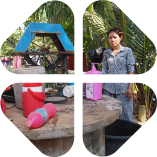 |
 Identification of new projects in WASH sector in Kampong Chhnang province, Cambodia
Czech Development Agency
The Czech development cooperation supports the development of sustainable drinking water, sanitation and hygiene infrastructure in selected locations, including rehabilitation and building of drinking water sources.
more
The purpose of this mission was to identify options for improved and sustainable access to drinking water for inhabitants of rural areas in the Kampong Chhnang province. This involved: On-site identification of potential projects in drinking water supply and groundwater management sector; assessment of likelihood of sustainability of the identified sources of drinking water; supporting with preparation of tender documentation. |
 |
 Evaluation of the project Economic Empowerment, Zambia
Diaconia of the Evangelical Church of the Czech Brethren (DECCB)
November 2018 – February 2019
The project, implemented between 2016-2018, was co-funded under the Czech Trilateral development cooperation instrument to complement funds provided by the Joint Country Program comprised of Norwegian Church Aid, DanChurch Aid and Christian Aid UK. The project aimed to improve the position of women in Zambian society and to contribute to their financial independence by supporting the creation of small businesses generating profits.
more
The evaluation assessed the project against the OECD DAC evaluation criteria (relevance, effectiveness, efficiency impacts and sustainability). Particular attention was paid to project management and organization, targeting and impacts on intended beneficiaries. |
 |
 Organization of 4 one-week-long seminars to strengthen civil society and trust among civil society and Ukrainian security services
Team4Ukraine
October – November 2018
The main aim of this project was to support the development of the Ukrainian civil society with emphasis on trust-building with the police. The secondary aim is the encouragement of an assertive approach of citizens towards government institutions.
more
Engagement in this project required gender sensitization in the field. This involved: presentation on gender-based violence and crime management in 12 project locations to local civil society, police and students. Radio broadcasts about the same issue. Promoting ties between civil society and police by helping to organize common interactive learning sessions with the participation of local civil society. The Gender Equality Expert also spoke on the local radio in the Luhansk region about gender-based violence. Other activities included monitoring of the security situation in the Luhansk and Donetsk region along the war line. Participating in meetings with relevant key officials from the local and central government and security representatives. Gathering of data to inform the project reporting. |
 |
 Rural Water SupRural Water Supply and Sanitation Project: The Preparation of Feasibility Study (FS), Detailed Engineering Design and Tender Documents, Environmental and Social Impact Assessment (ESIA) and Financial Management Technical Assistance
State Unitary Enterprise Khojagii Manziliyu Kommunali (KMK), funded by the World Bank
Implemented in association with SWECO Hydroprojekt a.s. July 2018 – December 2019
The Project aims to improve the current situation in the water supply and sanitation sector, with focus on nine districts in the Khatlon region. The areas covered by the Feasibility Study included Vakhsh inter-district water supply system, Vose District and Danghara – Temur Malik area. Vose District has been selected for the Detailed Design.
more
4G eval provided the services of International Social Expert, International Environmental Expert, local Legal Expert and Local Coordinator. Services included coordination at the local level and contributions to the Feasibility Study (Environmental and Social Analysis) to the Environmental and Social Management Framework (ESMF), the Resettlement Policy Framework (RPF) and to the Environmental and Social Management Plan (ESMP). The latter included monitoring plans for each project zone, institutional arrangements and responsibilities, human resources required for implementation, capacity building and training needs, reporting arrangements and modalities, monthly compliance checklist and report format, proposed disclosure procedure and arrangements and cost of ESMP implementation. |
 |
 Capacity Building for Itang Water Utility, Ethiopia
UNICEF
Implemented in association with Sachsen Wasser GmbH (lead company) and Zenas Engineering Plc June 2018 – May 2019
The project focused on lasting and resilient solutions for both refugees and hosting communities; equity in terms of distribution of services, ultimately preventing conflicts for access to (water) resources; and engagement of private sector to ensure quality and efficiency in the WASH service provision. The objective of the project was to support the Regional Water Bureau to fully establish the Itang Water Utility and build the management and technical capacity of the utility to independently manage the integrated water system in Itang Special Woreda.
more
4G eval prepared the Service Delivery Perception Survey, contributed to management manual and business plans and training of utility staff in accountability to clients. |
 |
 Osh Water Supply and Wastewater Rehabilitation Project – Phase II – Corporate Development, Stakeholder Participation and City Support Programmes
EBRD
Implemented in association with GMCS a.s. (lead company) June 2018 – December 2020
The project aims to rehabilitate the water supply and wastewater systems and to improve financial and operational management of the Osh City Vodokanal. The Corporate Development, Stakeholder Participation and City Support Programs aim to support further institutional strengthening in the form of operational and financial improvements to secure sustainability of the water utilities, implement a Stakeholder Participation Programme and the City Support Programme including Social Support Programme development.
more
Consultancy services focused on development of the Social Support Programme including affordability analysis, financial models with extrapolation under 8 different scenarios to estimate budgets for income based social measures as well as recommendations for tariff-based measures, capacity building in affordability analysis and methodology as well as implementation support during piloting, addressing sustainability issues and extending the support to the whole city. |
 |
 Nurek Water and Wastewater Project, Corporate Development, Social Support and Stakeholder Participation Programme
EBRD
Implemented in association with Sachsen Wasser GmbH July 2017 – March 2020
The Water Supply Company of the city of Nurek was established and started to operate as an independent business entity in 2014. The Company provides water supply and wastewater treatment services to the city as well as to parts of two adjacent districts. The project complemented the rehabilitation of the water supply system and selected wastewater improvements and aimed at improving billing and collection efficiency and financial and operational management, leading to the ultimate reduction in operating and maintenance costs for water supply and reducing wastage of water. It encompasses institution building assistance to the Company in the form of a Corporate Development Programme, Social Support Programme, and a Stakeholder Participation Programme.
more
Consultancy services focused on supporting the service provider and the city with: Establishing and mainstreaming environmental management processes and management systems compliant with relevant standards and procedures. Developing effective social protection measures for households unable to pay tariffs. Facilitating inclusive dialogue between the service provider, clients and other relevant parties. Raising awareness on issues related to water supply and sanitation and encouraging transparency. Identifying opportunities aimed at promoting equal access to employment and skills. |
 |
 Evaluation of the Project - Usage of renewable sources of energy for district heating system in the village of Nemila, Bosnia and Herzegovina
Ministry of Foreign Affairs, Czech Republic
April 2017 - December 2017
The main activities of the project were building a biomass heating plant (for wood chips) and the basic network of the heat distribution in the village of Nemila, located near the town of Zenica. The village of Nemila suffered during the heating seasons from significant air pollution. The pollution was caused mainly by the exhalations produced by individual housings using the traditional solid fuel. This led to health risks associated with the upper respiratory tract and other related diseases as well as to the environmental damages. Replacement of individual heat sources by central heating based on the use of cheap organic fuel contributed to a significant reduction of air pollution bringing up other positive impacts (health, environment, improvement of tourist attraction of the area etc.). Usage of renewable organic fuel serves as a long-term sustainable source of energy as there is a considerable amount of wood processing factories situated in the area of village of Nemila. The project facilities were heavily damaged by 2014 floods. Within the follow-up reconstruction the heat line distributions and technologies of boiler room were repaired. Afterwards, the project was handed over to the town of Zenica. The heating plant is currently being operated by local association – public company GRIJANJE d.o.o. Zenica.
more
The main purpose of the evaluation was to provide recommendations for further planning of development cooperation of the Czech Republic in the sustainable energy sector or eventually, in the field of environmental protection and climate. Recommendations considered the needs of Bosnia and Herzegovina with a focus on the thematic areas relevant for the future Program of the Bilateral Development Cooperation of Czech Republic with Bosnia and Herzegovina 2018 - 2023, i.e. economic growth or sustainable management of natural resources. Recommendations of the evaluation were used in the preparation of the medium-term plan for the development cooperation with Bosnia and Herzegovina and in the preparation and implementation of future projects. Evaluation was performed in accordance with the internationally recognized OECD/DAC criteria with an emphasis on the long-term impacts and sustainability of benefits and will pilot the methodology of cross-cutting evaluation principles of the Czech Republic Development Cooperation: Good governance, Environment and sustainable development, Human rights and gender equity. |
 |
 Tajik Water II – City of Khorog - Corporate Development and City Support Programmes
EBRD/SECO
Implemented in association with Sachsen Wasser GmbH March 2017 – November 2019
The city of Khorog has a population of about 30,000 and is located in the mountainous eastern part of Tajikistan in the Pamir Mountains. Water supply and sanitation services are provided by the Khorog Water Company. The objective of this project was to assist the Company to further improve its institutional development, building on the improvements made in a previous phase. The project consists of three parts: Part I – Continued Corporate Development Programme; Part II – Stakeholder Participation Programme; and Part III – Continued City Support Programme.
more
Consultancy services encompassed: (i) Support with the preparation and implementation of Gender and Equal Opportunities Plan: Review of equal opportunities and gender issues to be addressed within the Company as well as in service provision. Formulating Gender and Equal Opportunities Plan; support with the implementation of agreed measures. (ii) Support in environmental management: Review of the existing Environmental Action Plan (EAP) and environmental management system; identification of areas for improvement; establishing awareness of environmental responsibility; recommendations for improvements and for further development of the EAP. Implementation support of the updated EAP. (iii) Support the Company and the City in the planning and implementation of the Stakeholders’ Participation Programme aimed at enhancing public ownership by encouraging water conservation, increasing public participation in the provision of water and wastewater services (service quality, rehabilitation activities, tariffs integrating poverty and social issues) and raising public awareness on issues related to the project implementation and water use. |
 |
 Green Cities Action Plan, Tbilisi
EBRD/Tbilisi City Hall
Implemented in association with ENVIROS s.r.o. November 2016 – December 2017
Major environmental concerns for cities range from the quality of air and traffic congestion to pressure on limited green space, land and water resources. Urban activities, and how they are organized deeply affect the environment, and the overall quality of life of urban populations. For the sustainable development of green cities, it is critical to recognize the relationship between environmental aspects and economic and social issues. As a part of the Green Cities Initiative, the Bank together with the OECD and ICLEI prepared a methodology for the development of Green City Action Plan (GCAP). The Methodology is designed to guide a City through 4 main steps of the development and implementation of a GCAP – from establishing a Green City Baseline, developing a vision, preparing the GCAP, implementing the actions and reviewing progress. The objective of this project is to apply the Methodology and assist the City of Tbilisi in developing and adopting a Green City Action Plan.
more
Consultancy services included: Preparing the first full draft of GCAP based on inputs from all four steps of the Plan’s development; incorporating amendments by the Client. Preparing draft public presentation, assisting with the preparation and implementation of the presentation. Assisting the Client in preparing a presentation of the draft Council resolution on the GCAP at the Council meeting. Preparing plan for monitoring the implementation of and progress on selected key measures based on Green City Indicators. Organizing three one-day training and capacity building workshops for City officials. |
 |
 GOAL Uganda Water, Sanitation and Hygiene (WASH) Programme Evaluation
GOAL Ireland
Implemented in association with SaafConsult B.V. July 2015 – March 2016
The emphasis for GOAL Uganda’s work in WASH over the period 2012-2015 had been to create new and to sustain existing water points and to increase access of communities to sanitation and hygiene. This has been implemented both directly and through national partners. Along with partners, GOAL has also been engaging at a district level to strengthen institutional capacity. The main purpose of the evaluation was to obtain objectively substantiated and consistent conclusions that can be used by GOAL in the decision making on the future direction of the rural WASH sector with focus on safe water supply, operation and maintenance of water services, sanitation promotion (CLTS) and hygiene promotion.
more
The evaluation covered four districts in the East and North of Uganda. Methods included review of secondary data, key informant interviews, focus group discussions and observations. In addition to the OECD DAC criteria, the evaluation also included assessment of the 10 GOAL’s WASH principles using a standard methodology developed by 4G eval to allow cross-country meta-analysis. Recommendations based on findings and conclusions were formulated for the sanitation and hygiene program, for the water supply program as well as for the GOAL processes and mechanism and the GOAL systems. |
 |
 Evaluation of the Sanitation Improvements through Market Strategies project, Kenya
GOAL Ireland
Implemented in association with SaafConsult B.V. April – August 2016
The Sanitation Improvements through Market Strategies had been implemented between 01 January 2013 and 31 March 2016 in one of the largest slums in Nairobi, the Mukuru slum located in the East of the capital. Among the many problems the slum dwellers are facing is the lack of proper sanitation and infrastructure causing vicious outbreaks of disease. The project was designed to address the sanitation crisis and overcome the inherent constraints in a slum community. Having drawn on lessons from other sanitation projects in Mukuru, Kibera and other slums around Nairobi, the project focused on supporting supply of high-quality sanitation facilities on commercial basis and facilitating demand for these services. The waste was collected, processed and marketed as fertilizer, thus creating a complete sanitation value chain. The project also served as a key learning platform to identify best practices and inform various stakeholders including the government of Kenya on cost-effective strategies to deliver adequate sanitation in urban slums.
more
The main purpose of the evaluation was to obtain objectively substantiated and consistent conclusions that can be used in the decision making of GOAL on the future direction in Kenya in the urban slums sanitation sector with focus on increasing access to affordable sanitation using the Sanitation Improvements through Market Strategies (SIMS) approach. The evaluation was conducted in line with the principles set out by the Development Assistance Committee (DAC) of the OECD with reference to project relevance, efficiency, effectiveness, impact and sustainability. An additional objective is to assess the project against GOAL’s 10 Key WASH Principles with an objective measurement to allow cross-country meta-analysis. |
 |
 Mitigation of Risks from Dumpsite of Hazardous Waste – Cismichioi, Moldova
Czech Development Agency
January 2016 – July 2017
The dumpsite of hazardous waste in Cismichioi has been developed between 1977 – 1987. It contains between 4-16 thousand tons of pesticides and other chemical substances stored in concrete cases and underground repositories, partially isolated by plastic wraps. Their estimated volume could be up to 27,000 m3. The exact content of the storages, status of their protection or the level of potential leakages in the surrounding areas are not known. The purpose of the project is the identification and assessment of potential environmental risks and liabilities and the preparation of a detailed feasibility study outlining mitigation measures in accordance with guidelines of the Czech Ministry of Environment.
more
Consultancy services encompassed support with project planning, budgeting and formulation, technical aspects of tender documentation, as well as with the evaluation of proposals. The consultant also provided implementation support and technical backstopping and assists the CZDA with monitoring of project progress and results. |
 |
 Evaluation of GOAL’s WASH Programme in India
GOAL Ireland
Implemented in association with SaafConsult B.V. September 2015 – January 2016
The main purpose of the evaluation was to obtain objectively substantiated and consistent conclusions that can be used for future planning and implementation of on the future direction of GOAL in India in the Water, Sanitation and Hygiene (WASH) sector with focus on School Led Total Sanitation (SLTS), Community Led Total Sanitation CLTS and social marketing.
more
The evaluation was conducted in line with the principles set out by the Development Assistance Committee of the OECD with reference to program relevance, efficiency, effectiveness, impact and sustainability. In addition, the program was assessed against the strategic GOAL and objective for GOAL globally and against GOAL’s 10 Key WASH principles using a standardized methodology developed by 4G eval to allow cross-country meta-analysis. Scope of the evaluation: CLTS, SLTS intervention in West Bengal. Period covered by this evaluation: 2012 – 2015. |
 |
 Evaluation of the Chuko Food Security Project, Ethiopia
Diaconia Czech Republic
August 2015 – January 2016
The project supported some 14,600 households in improving food security by increasing and diversifying crop and livestock farming, improving access to water and sanitation and supporting income generating activities.
more
The evaluation assessed achievement of results, sustainability, shared responsibility and accountability, appropriateness of design and resource allocation for the individual components as well as for the project as a whole. Lessons learned will provide guidance for decisions on continuation of support as well as on processes and implementation mechanism. |
 |
 Impact Evaluation of Community Led Total Sanitation (CLTS) approach in Sierra Leone Country Program
GOAL Ireland
Implemented in association with SaafConsult B.V.,GOAL Ireland August – December 2015
The program aims at improving sanitation coverage and hygiene behavior of communities in Kenema district through the Community-Led Total Sanitation (CLTS) approach. The expected outcomes for this approach are: (i) Decrease in the incidence of diarrhea in targeted communities in Kenema District; (ii) Increase in the adoption of safe hygiene and sanitation practices in targeted communities in Kenema District; and (iii) Increased sustainability through communities’ ownership of water and sanitation development issues in targeted communities.
more
The evaluation covered the period 2008 – 2015. The aim of the evaluation was to assess the impact, relevance, efficiency, effectiveness, and sustainability of the CLTS program and to recommend ways of improving and scaling up the program. Mixed methods were used to establish the relevance, effectiveness, efficiency, impacts and sustainability of the interventions: Quantitative survey, review of secondary data, key informant interviews, focus groups discussions and observations. The evaluation also included assessment of the 10 GOAL’s WASH principles using a standard methodology developed by 4G eval to allow cross-country meta-analysis. |
 |
 Complex Evaluation of the Development Cooperation of the Czech Republic in the Sector Water Supply and Sanitation in Ethiopia
Ministry of Foreign Affairs, Czech Republic
May 2014 – October 2014
The evaluation was based on six projects implemented between 2010 – 2014 in the Southern Nations, Nationalities and People’s Region (SNNPR) of Ethiopia under the Czech Development Cooperation.
more
The principal purpose of the evaluation was to obtain objectively substantiated and consistent conclusions that can be used in the decision-making of the Ministry of Foreign Affairs of the Czech Republic, in collaboration with the Czech Development Agency, on the future direction of the Czech development cooperation in Ethiopia in the Water, Sanitation and Hygiene (WASH) sector. Conclusions inferred from the evaluation can also be used for improving the implementation the WASH Sector Program and as the basis for the implementation of sector strategy and the synergic orientation of future projects, or for decisions concerning the implementation of similar projects in other partner countries. |
 |
 Evaluation of the National Water Management System in the Palestinian Autonomous Territories - MYWAS
Ministry of Foreign Affairs, Czech Republic
April – September 2014
The Multi Year Water Allocation System (MYWAS) project (2011 – 2014) has been implemented by the Palestinian Water Authority (PWA) under the coordination of the Czech Development Agency (CZDA). It has built upon stage wise support from the Czech development cooperation (CZDC) to effective integrated water resource planning dating back to 2008. The intended outcome of the project was the introduction of MYWAS for optimizing planning of investments in the water and sanitation sectors using economic aspects as the main criteria.
more
The principal purpose of the evaluation was to obtain objectively substantiated and consistent conclusions that can be used in the decision-making of the Ministry of Foreign Affairs (MFA), in collaboration with the CZDA, on the future direction and implementation modalities of the CZDC in the Palestinian Autonomous Territories in general and in the water sanitation and hygiene sector in particular. The evaluation covered the progress in the implementation of the unfinished project, with an emphasis on the roles played by all stakeholders and their interaction. |
 |
 Strategy for Drinking Water Supply in Bela Crkva Region of Serbia (Phases I and II)
Czech Development Agency
February 2014 – December 2016
Bela Crkva, located in Vojvodina province, had no clear strategy for the management of drinking water and waste water. The volume of extracted groundwater and consumed water was not exactly known, drinking water quality fluctuated, levels of pollution due to uncontrolled waste water discharge were not regularly monitored, there was no inventory or map of the potential water sources. This has impacted on people’s health as well as on the quality of environment. The purpose of the first phase of the project was to develop medium and long – term drinking water management strategy including project documentation for the implementation of selected technical solutions under phase II. Phase II included the realization of these technical solutions and measures to improve the drinking water supply in the region.
more
Consultancy services included support with project planning, budgeting and formulation, technical aspects of tender documentation, as well as with the evaluation of proposals. The consultant also provides implementation support and technical backstopping and assists the Czech Development Agency with monitoring of project progress and results. |
 |
 Evaluation of two Projects in the Natural Resource Management Sector in Ethiopia
Ministry of Foreign Affairs, Czech Republic
April – June 2013
The principal purpose of this evaluation was to obtain information that will guide decision-making on upcoming interventions of Czech development cooperation in Ethiopia in the sectors Soil and Water Conservation and Water Supply and Sanitation (WASH).
more
The evaluation included two completed projects: Anti-erosion Measures in the Surrounds of Lake Awassa and Sustainable Management of Soil, Forest and Water Resources as a Pilot Model for Community Development in Southern Ethiopia. Both projects were implemented in Southern Nations, Nationalities and People’s Region (SNNPR) of Ethiopia under the Czech development cooperation. Scope included assessment against the OECD DAC evaluation criteria and cross cutting principles of the Czech development cooperation: Good governance, human rights and gender and environment. |
 |
 Water Supply from Deep Boreholes for Herdsmen in Zavkhan Region, Mongolia
Czech Development Agency
October 2012 - December 2016
Zavkhan, an agricultural/pastoralist region in the western part of Mongolia, faces serious problems with access to water for both, people and livestock. One of the main problems is shortage of hydrogeological know how. Siting and drilling is often implemented without proper hydrogeological investigation and is not well documented, the maintenance and operation of wells not adequate. The situation is further exacerbated by difficult geological and hydrogeological conditions including permafrost and depth of groundwater level which reaches up to 200 m. The project had two objectives: Improving access to drinking water for the nomadic pastoralists by constructing drilled wells and distribution systems; and transfer of hydrogeological know how for the planning and implementation of drilling for water and constructing sustainable water supply systems under the local conditions.
more
Consultancy services included support with project planning, budgeting and formulation, technical aspects of tender documentation, as well as with the evaluation of proposals. The consultant also provided implementation support and technical backstopping and assists the Czech Development Agency with monitoring of project progress and results. |
 |
 Transfer of know-how on Approaches to Remediation of Environmental Burdens, Mongolia (Phases I and II)
Czech Development Agency
October 2012 – December 2017
With the transition to market economy in the nineties, the Government of Mongolia started to address environmental burdens inherited from the Soviet period and sometimes exacerbated by the transition to market economy. The major ones include storages of fuels and chemicals with uncontrolled leakages of oil substances, often dilapidated and potentially polluted military zones, or the emergence of small scale, unregulated mining with the possible consequences of contamination by mercury, cyanide and other heavy metals.
more
Consultancy services included support with project planning, budgeting and formulation, technical aspects of tender documentation, as well as with the evaluation of proposals. The consultant also provided implementation support and technical backstopping and assisted the Czech Development Agency with monitoring of project progress and results. |
 |
 Evaluation of two Projects in the Surface Water Monitoring and Flood Protection Sector, Moldova
Ministry of Foreign Affairs, Czech Republic
September – December 2012
The evaluation included two projects: Monitoring surface water and flood protection in the Reut River Basin (2006 - 2008) and Rehabilitation of Network of Monitoring Stations in Watershed of the River Prut – Modernization of Information System and Flood Protection (2010-2012). Both projects aimed at improving standards of information required for the preparation of flood protection measures in Moldova by developing a system that would provide speedy and accurate information on the status of surface water levels and their prognosis for the watershed of the rivers Prut and Reut. The purpose of the evaluation was to obtain objectively substantiated information to be used for decision making on the overall perspective and future involvement of the Czech development cooperation in the environmental sector, sub-sector hydrometeorology and Climatology.
more
Evaluation focussed on the assessment of relevance, effectiveness, efficiency, sustainability and long-term impacts. Cross cutting issues included: Good governance, human rights and gender, viability of technical solution and consideration of environment and climatic changes. Formulated recommendations pertaining to the projects as well as to the continuation, processes and mechanism of Czech development cooperation in the environmental protection sector in Moldova. |
 |
 Remediation of Environmental Burdens caused by Petroleum Substances in Lunga and Marculesti, Moldova (Phases III and IV)
Czech Development Agency
August 2012 – December 2018
The project aimed to improve the environment and health of population by the mitigation of negative environmental impacts caused by pollution from petroleum substances deposited at a former military airport in Mărculeşti. Extensive leakages from improperly secured fuels cause pollution of groundwater that the majority of population in the area uses as source of drinking water. Rehabilitation of the area started with the assessment of risks followed by a feasibility study. A hydraulic pump and treat technology has been selected as the best option for groundwater treatment. The decontamination process is systematically monitored and data series used for prognosis of pollution migrations and for updating risk analysis.
more
Consultancy services encompassed support with project planning, budgeting and formulation, technical aspects of tender documentation, as well as with the evaluation of proposals. The consultant also provided implementation support and technical backstopping and assisted the CZDA with monitoring of project progress and results. |
 |
 Evaluation of two completed projects in the social sector, Mongolia
Ministry of Foreign Affairs, Czech Republic
May – September 2012
The evaluation covered two projects: Socioeconomic Stabilization of Geographically and Socially Excluded Communities, Mongolia (2008 – 2010) and Preparation and Launch of Study Programme Social Work, Ulánbátar (2006 – 2010). Both projects were funded under the Czech development cooperation and implemented by Caritas CZ. The project Socioeconomic Stabilisation of Geographically and Socially Excluded Communities aimed at contributing to socio-economic stabilization of rural, isolated communities of Bulgan aimak and at decreasing the incidence of social pathological behavior resulting from inadequate contact of small children with their families by providing mobile education to drop outs, pre-school and handicapped children and training to social workers. The Study Programme Social Work aimed at improving the quality of education of social workers and of the social services.
more
The principal purpose of the evaluation was to obtain objective information to be used by the Czech Ministry of Foreign Affairs (MFA CZ) in cooperation with the Czech Development Agency (CZDA) for decision-making on the perspective and future focus of Czech development cooperation in the social and related sectors in Mongolia. Particular attention was paid to sustainability and replicability of results. |
 |
 Evaluation of Small and Medium Sources of Energy and Related Distribution Networks in Selected Areas of Palestine
Ministry of Foreign Affairs, Czech Republic
May – September 2012
The project implemented between 2006 – 2011 aimed to contribute to the improvement of economic and social situation of local population and to the economic development in Tubas and Jenin governorates by modernizing and extending electricity supply in the respective areas. The evaluation covered the OECD DAC criteria with focus on sustainability of positive outcomes.
more
The main purpose of the evaluation was to obtain objectively, well-founded information that can be used for decision making by the Ministry of Foreign Affairs of the Czech Republic (MFA CZ) in cooperation with the Czech Development Agency (CZDA) about the overall perspective and future direction CZ DC in Palestine with respect to production and supply of energy and related sectors. |
 |
 Evaluation of 3 Projects of Czech Development Cooperation in Serbia in the Environmental Sector
UNDP Europe and the CIS, Bratislava Regional Centre
August – September 2011
The evaluation included three projects: Increasing the Capacity of Drinking Water Supply in the Region of Boričevac Town (2008 – 2010); Site Investigation and Rehabilitation of Ada Huja Area (2008 – 2010) and Introducing Environmentally Sound Disposal of Petroleum Substances and Hazardous Wastes (2006 – 2010). The project “Increasing the Capacity of Drinking Water Supply in the Region of Boricevac Town” aimed at increase the capacity of potable water supply to citizens of the Valjevo city and its district of Boricevac by creating technical conditions enabling the connection of over 7,000 citizens to water supply network. The project “Site investigation and remediation of the region of Ada Huja” aimed at the improvement of environment and health in the Serbian capital of Belgrade by means of creating conditions for the rehabilitation of the Ada Huja peninsula region. The project "Introducing Environmentally Sound Disposal of Petroleum Substances and Hazardous Wastes " combined complex technical, chemical and logistical know – how which included solutions to the broad spectrum of problems with environmental burdens, created by the operation of the Panchevo refinery.
more
The main purpose of this evaluation was to obtain lessons learned and information to be used in decision-making as regards future interventions of Czech development cooperation (CZDC) in Serbia in the environment sector. The evaluation covered the OECD/DAC criteria: relevance, effectiveness, efficiency, sustainability and long-term impacts as well as cross cutting issues of the CZDC: Good governance, environment, human rights and gender. |
 |
 Assessment of the Development Cooperation of the Czech Republic in the Water Supply and Sanitation Sector in the SNNPR Region, Ethiopia
Czech Development Agency (CZDA)
Implemented in Association with AKSES s.r.o., Czech Development Agency (CZDA) June – October 2011
The purpose of this assessment was to advise on focus for the 2011- 2017 water and sanitation sector program and guide decision-making of the Czech development cooperation in Ethiopia. Conclusions of the assessment have been used by the Ministry of Foreign Affairs of the Czech Republic (MFA CZ) and Czech Development Agency for planning, identification and formulation of project activities. Scope: rural areas of Sidama zone, Southern Nations, Nationalities and People’s Region (SNNPR) of Ethiopia. This involved assessment of the current state, formulating sustainable options for technical solutions, assessing ground water resource management, prioritizing areas on the basis of hydrological and hydrogeological considerations, assessing social, economic and environmental impacts of proposed options, assessing the feasibility of technical and “soft” solutions, and formulating recommendations for future interventions in the sector in the area.
more
|
 |
 Mitigation of Environmental Burdens Caused by Pesticides, Moldova (Phases I and II)
Czech Development Agency
April 2011 – December 2015
In Moldova, blanket use of pesticides in agriculture has been discontinued in the nineties. The remaining supplies have been stored in regional central storages without detailed evidence of their chemical composition. Solid pesticides in plastic bags were stored in closed plastic barrels, liquid in metal barrels. A number of donors launched projects aiming at their removal including, since 2011, the Czech Republic. The project focused on Singerei, Oniscani, Pelivan and Papauti localities with the aim to remove and dispose of the toxic waste, and to assess the environmental and health impacts of the residual pollution.
more
The consultancy included identification of warehouses with obsolete pesticides in the project area, the assessment of their condition and potential risks and the prioritization of interventions. On the basis of this assessment, the consultant assisted with drafting project and tender documentation including budget and with providing implementation support and monitoring services including recommendations for the Czech Development Agency on future direction of the similar interventions in the project area. |











